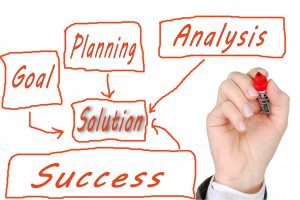We live in a culture that glorifies being busy and taking on as many tasks as possible. Multitasking is not just a way to get a few things done, it is considered a valuable skill to be listed on resumes. But there are good reasons to reexamine the idea that multitasking means getting more done. We may actually be doing ourselves and our work a disservice by working on many projects at once or rapidly jumping from task to task.
Multitasking breeds stress
It’s not surprising: assigning your employees – or yourself! – an overwhelming amount of work can lead to being, well, overwhelmed. Taking on too many things at once and assuming you can multitask your way out of it can lead to feelings of frustration and stress as your brain attempts to keep up with the extra work. More often than not, you will end up bringing these emotions home from the office, and your to-do list will extend late into the night, throwing off your work-life balance (and robbing you of precious sleep!).
Instead of succumbing to the temptation to multitask – and the stress it brings – try making a list each day that prioritizes your to-dos. Focus on one at a time, cross each one off when you’re done with it, and reward yourself with a break after completing a certain number of tasks. You’ll be surprised at how much faster things can get done when you’re focused and calm. Then, when the day is done, put the list away and don’t pick it up again until tomorrow!
Make sure you’re giving your employees a manageable amount of work, and encourage them to prioritize their to-do lists, as well. Stressed and overburdened employees are not only not as productive, but they are also less likely to be happy in their job and are more likely to want to move on. Ensuring that they, too, have a good work-life balance is good for your business as well as their mental health and happiness.
Quantity vs quality
Multitasking may be stressful, but at least it means you’re getting a lot done, right? Well, maybe. But are you actually sacrificing the quality of your work by trying to get so much done at once? When you multitask, you’re attempting to manage multiple thoughts and actions at once, and this can lead to cognitive overload. Both your brain power and your work are likely to suffer as a result. In fact, a study done by Stanford University proves that multitasking limits your ability to produce high quality work. The study found that a person’s IQ drops an average of 17 points when attempting to multitask, and that we are as much as three times as likely to make common mistakes when managing two or more tasks simultaneously.
For entrepreneurs and employees alike, the focus should be on getting things right the first time. Instead of spending precious time and resources going back and fixing mistakes, banning multitasking gives your brain the chance to tune into the task at hand, creating higher quality work.
Reframe to refocus
How do we turn off that part of our brain, or our ego, that tells us that we constantly need to be doing more? You can start by reframing your perspective. Think about the positives of focusing on one project at a time. When focused, you are able to:

- Listen actively and retain important information
- Stay present and tune in to your own needs
- Be more perceptive to mistakes or potential issues
- Think creatively and outside of the box
- Problem solve efficiently
These qualities make you a better entrepreneur, boss, parent, partner, and friend. You’ll be able to react reflectively, find creative solutions to problems, listen responsively, and catch your own mistakes.
By highlighting the positive aspects of focused work, putting an emphasis on quality over quantity, and working to reduce stress and improve work-life balance, multitasking can – and should – become a thing of the past.
